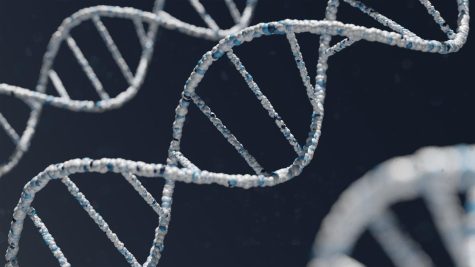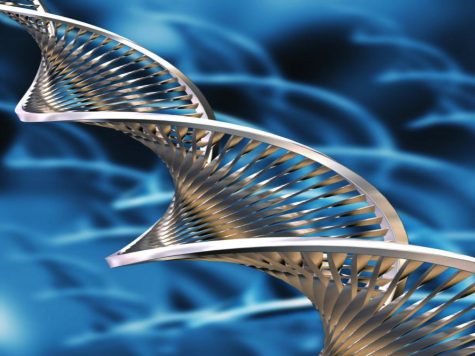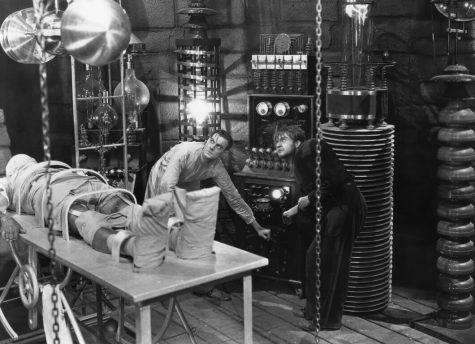The Ethics of Genetic Engineering in Relation to Frankenstein

Mary Shelley’s Frankenstein is a novel that presents moral and ethical questions that are prevalent in today’s scientific advancements. In this fictional account, Victor Frankenstein creates a humanoid monstrosity and regrets his actions the moment the Wretch comes to life. Upon the resurrection of his brainchild, Frankenstein abandons the Wretch into the world, causing suffering for himself, others, and his creation. As the story progresses, Frankenstein finds himself in an existential crisis. Due to his lack of foresight, he loses the people he loves the most, creating internal conflict from his actions that ultimately drives him to insanity. In today’s society, scientists are faced with similar struggles; as genetic and biological engineering evolves and develops, many ethical concerns come to light. The current advances are both positive and negative and many are reflected in the novel Frankenstein, showing how new technologies could potentially help society or cause long-term damage resulting from unintended consequences.
Genetic and biological engineering has helped improve the well-being and quality of life of many people. Notably, artificial hips, knees, other joints, and various surgical devices have saved countless lives and have benefited society. Advancing technology has made recovery from medical procedures shorter, less invasive, and with better outcomes (National Library of Medicine). People are also living longer, and diseases that were once fatal are now simply inconveniences. Moreover, genetically modified foods have contributed to disease and drought-resistant plants as well as faster-growing plants and animals. “Genetic engineering allows scientists to select one specific gene to implant. This avoids introducing other genes with undesirable traits” (Medline Plus). Biological and genetic developments aid society and are crucial in our path to overcoming many global problems. These improvements reduce starvation and, in the end, may even decrease poverty.
Although these advancements have helped in many ways, there will always be risks of misuse, accidents, and unintended consequences. The accidental release of creations such as diseases, GMO pollens, and invasive species must be recognized and are already prevalent in society today. “The release of genetically altered organisms in the environment can increase human suffering, decrease animal welfare, and lead to ecological disasters” (Häyry and Tuija). Foreboding mistakes and hazards have been documented and are a genuine threat to society. Much like the release of the Wretch, there must be caution and understanding of the possible dangers of future innovations. The potential release is not the only uncertainty; there is also growing evidence to support that genetically engineered foods may cause allergic reactions and may lead to cancer. (The Center of Food Safety), As these studies continue, it is unknown if these advancements do more harm than good.
Morality around altering the natural world is an ever-increasing debate that is paramount to the scientific community as technological advances continue. This topic of opinion will never be unanimously agreed upon due to its complicated and controversial nature. Many in the scientific world agree on the dangers of continuing genetically engineered studies because of the fears of unexpected outcomes. “The purely social and political dangers of genetic engineering include the possibility of increased economic inequality accompanied by an increase in human suffering, and the possibility of large-scale eugenic programs and totalitarian control over human lives. The risk in these cases is clearly moral rather than technical” (Häyry and Tuija). Repercussions of various scientific advancements can lead to problems around social injustice. Scientists have the means to make exponential progress in these fields but are halted by morality and ethics. Many scientists, including Frankenstein, desire to create and discover, which may lead to conflict in both the person and their community.
In Frankenstein, the Wretch felt like an outcast because he was hated from the moment he was born. He knew he would never fit into any communities and was thrown into a harsh and unforgiving world without consent. “I was poor, helpless, miserable, wretch; I knew, and could distinguish nothing; but feeling pain invade me on all sides, I sat down and wept.” (Shelly 112). The way that he was brought to life was very inhumane and unethical. Frankenstein never nurtured his creation, leading to suffering for himself and the Wretch. “This idea pursued me, and tormented me at every moment from which I might otherwise have snatched repose and peace… I was miserable, and overcome by a thousand fears…” (185). The outcomes of Victor’s actions sent him into agonizing distress from the premonition of the Wretch’s arrival. Although the creation of the Wretch was primarily negative, the lessons from the experience caused realization for both Victor and the reader that could be viewed as constructive and even beneficial. This could be seen when Victor issues words of warning to Captain Walton, advising him not to make the same mistakes. It is through self-reflection and remorse, Victor is able to come to terms with the mistakes he has made, finding tragic peace before he dies.
Today, there is an increasing amount of biological and genetic engineering that have both positive and negative consequences. Discoveries concerning morality, create controversy as to whether or not the risks outweigh the benefits of a potentially improved society. Many similar implications of current advancements are seen in the novel Frankenstein written over 200 years ago. What was prevalent then is still seen in today’s society. Whether Mary Shelley was aware or not, her book is a warning to the scientific community
Works Cited
Ball, Philip. “Designer Babies: An Ethical Horror Waiting to Happen?” The Guardian, Guardian News and Media, 8 Jan. 2017, www.theguardian.com/science/2017/jan/08/designer-babies-ethical-horror-waiting-to-happen.
“Bioengineering.” The University of Toledo, www.utoledo.edu/engineering/bioengineering/.
Clark, Douglas B. “Planning a Safe Release of Genetically Modified Organisms.” AIChE, 3 Aug. 2017, www.aiche.org/chenected/2017/08/planning-safe-release-genetically-modified-organism.
“GE Food & Your Health: | GE Food & Your Health.” Center for Food Safety, www.centerforfoodsafety.org/issues/311/ge-foods/ge-food-and-your-health.
“Genetically Engineered Foods: Medlineplus Medical Encyclopedia.” MedlinePlus, U.S. National Library of Medicine, medlineplus.gov/ency/article/002432.htm.
History.com Editors. “Eugenics.” History.com, A&E Television Networks, 15 Nov. 2017, www.history.com/topics/germany/eugenics.
Häyry, M, and T Takala. “Genetic Engineering and the Risk of Harm.” Medicine, Health Care, and Philosophy, U.S. National Library of Medicine, 1998, www.ncbi.nlm.nih.gov/pubmed/11081284.
Resnik, David B, and Daniel B Vorhaus. “Genetic Modification and Genetic Determinism – Philosophy, Ethics, and Humanities in Medicine.” BioMed Central, BioMed Central, 26 June 2006, www.peh-med.biomedcentral.com/articles/10.1186/1747-5341-1-9.
Turvey, John, and Mary Shelley. Frankenstein. Longman, 1998.
“What Is Genetic Engineering?” Your Genome, The Public Engagement Team at the Wellcome Genome Campus, 17 Feb. 2017, www.yourgenome.org/facts/what-is-genetic-engineering.








